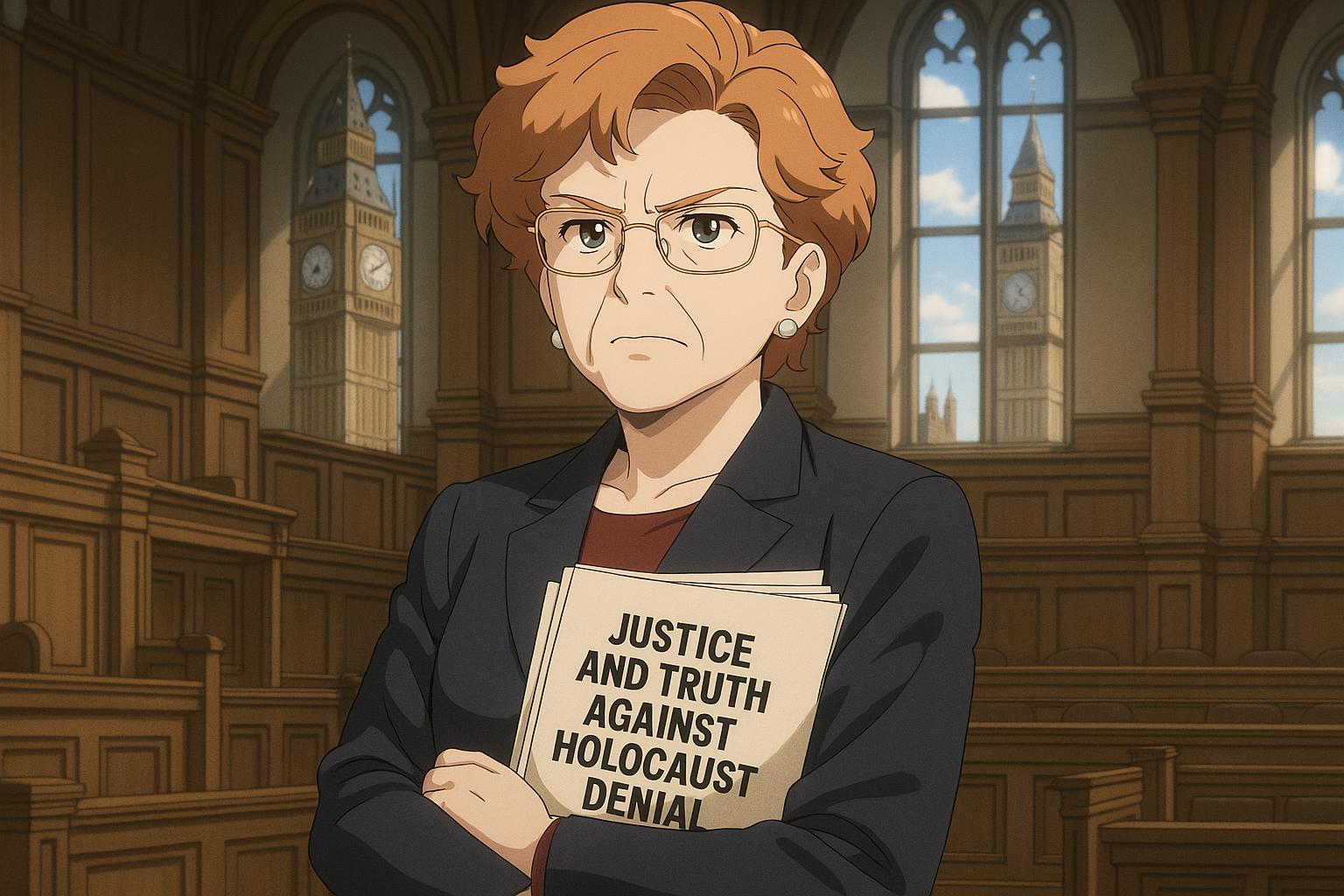As the 25th anniversary of Deborah Lipstadt’s landmark legal victory over Holocaust denier David Irving approaches, she reflects on the trial’s enduring impact on combating anti-Semitism and defending historical truth amid ongoing challenges.
Deborah Lipstadt’s landmark victory against Holocaust denier David Irving stands as a significant moment in the fight against anti-Semitism and the distortion of historical facts. As the 25th anniversary of this high-profile case approaches, Lipstadt reflects on the daunting legal battle that unfolded in London’s High Court and the lasting implications it has had on the discourse surrounding Holocaust denial.
The trial, which took place in 2000, was ignited when Irving initiated libel proceedings against Lipstadt after she referred to him as a Holocaust denier in her 1994 book, “Denying the Holocaust: The Growing Assault on Truth and Memory.” The stakes were incredibly high, as Lipstadt argued in the Mail about the potential ramifications: had Irving won, it could have legitimised Holocaust denial as a credible perspective. “There are just some things you can’t settle,” she asserted, illustrating her firm stance against any minimisation of the Holocaust’s historical reality.
Irving, who in 1977 had published a biography of Adolf Hitler that substantially downplayed the Holocaust, claimed that he had not intended to vilify survivors or their families. However, during the trial, the presiding judge, Mr Justice Charles Gray, sided firmly with Lipstadt, declaring Irving to be “an active Holocaust denier” and branding him as “anti-Semitic and racist.” He noted Irving’s associations with right-wing extremists and pointed to numerous examples of historical distortion in his work—culminating in a damning assessment of Irving’s credibility.
Many were apprehensive about Lipstadt’s decision to fight the case in court, fearing that a public trial would inadvertently give Irving more attention. Jewish communities in the UK expressed concerns that the overwhelming focus on the case might provide a platform for Irving’s agenda. Yet, Lipstadt persevered, stressing that the alternative—acknowledging any semblance of legitimacy to Irving’s claims—was unacceptable. “I don’t think I would have been able to look any survivor in the eye ever again if that had happened,” she revealed. Her determination not only represented a fight for her truth but for the very integrity of historical memory.
The impact of the trial extended far beyond the courtroom. The ensuing publicity highlighted the dangers posed by Holocaust denial and reinvigorated discussions regarding anti-Semitism in contemporary society. Lipstadt’s lawyers, including Anthony Julius and the late Richard Rampton, played vital roles in meticulously dismantling Irving’s narrative. Rampton’s approach was notably thorough; he visited Auschwitz and studied wartime documents to ensure that every claim could withstand scrutiny. His powerful courtroom declaration, labelling Irving a “falsifier of history,” laid bare the fabrications of Irving’s arguments.
Since the trial, Lipstadt has continued to be a prominent voice against anti-Semitism. Her role as the United States Special Envoy for monitoring and combating anti-Semitism places her at the forefront of combatting these persistent ideologies in a modern context. In light of recent anti-Semitic incidents and the increasing tensions surrounding Israel and Hamas, she has cautioned against making direct historical comparisons to the Holocaust. She argues that doing so may detract from the unique and horrific realities of that period. “Anti-Semitism can be very bad and very troublesome… without it having to be akin to the Holocaust,” she stated, emphasising the importance of addressing hatred in its own right rather than minimising or equating it to historical events.
As Lipstadt revisited the site of her monumental trial, she recounted being pushed to settle the case, but her resolve remained unshaken. “I think fighting is exceptionally important. Standing up for your beliefs is important. Because if you don’t stand up, it just encourages them,” she urged, highlighting the ongoing battle against those who seek to distort historical truths for their own ends.
Today, Irving’s legacy is one of discredit and disgrace; he has faced legal repercussions for his statements and actions and continues to cling to his controversial views, attempting to monetise his narrative through guided tours aimed at Holocaust deniers. Yet, amidst this backdrop of disinformation, Lipstadt’s unwavering stance in defence of truth underscores the critical need for vigilance in the fight against anti-Semitism.
The lessons of the trial—and Lipstadt’s commitment to historical accuracy—remain relevant today, reminding us of the continuous struggle against misinformation and the necessity of standing firmly against those who seek to deny the truth of history.
Reference Map
- Paragraphs 1, 2, 3, 4, 5, 6, 7, 8, 9, 10
- Paragraph 4
- Paragraph 4
- Paragraphs 1, 2, 8, 10
- Paragraph 4
- Paragraphs 1, 4
- Paragraph 10
Source: Noah Wire Services
- https://www.dailymail.co.uk/news/article-14664075/David-Irving-Deborah-Lipstadt-Denial-2016.html?ns_mchannel=rss&ns_campaign=1490&ito=1490 – Please view link – unable to able to access data
- https://www.theguardian.com/books/2000/apr/11/irving.uk – An article from The Guardian detailing the outcome of the libel case brought by David Irving against Deborah Lipstadt. The High Court ruled in favor of Lipstadt, stating that Irving had failed to prove his reputation was damaged and labeling him a ‘right-wing, pro-Nazi polemicist’ and an ‘active Holocaust denier’.
- https://www.latimes.com/archives/la-xpm-2000-apr-12-mn-18571-story.html – A Los Angeles Times report on the High Court’s decision in the libel case between David Irving and Deborah Lipstadt. The court found Irving to be ‘anti-Semitic and racist’, rejecting his claims of libel and affirming Lipstadt’s portrayal of him as a Holocaust denier.
- https://www.ushmm.org/confront-antisemitism/antisemitism-podcast/deborah-lipstadt – An interview with Deborah Lipstadt on the United States Holocaust Memorial Museum’s podcast, discussing her 1993 book ‘Denying the Holocaust’ and the subsequent libel suit filed by David Irving. Lipstadt reflects on the trial and its implications for combating Holocaust denial.
- https://www.amazon.com/Denial-Holocaust-History-Deborah-Lipstadt/dp/0062659650 – The Amazon page for Deborah Lipstadt’s book ‘Denial: Holocaust History on Trial’, which recounts the libel trial where she defended herself against David Irving’s accusations of being a Holocaust denier. The book provides an in-depth look at the trial and its significance.
- https://www.theguardian.com/books/2000/apr/11/irving.uk – An article from The Guardian detailing the outcome of the libel case brought by David Irving against Deborah Lipstadt. The High Court ruled in favor of Lipstadt, stating that Irving had failed to prove his reputation was damaged and labeling him a ‘right-wing, pro-Nazi polemicist’ and an ‘active Holocaust denier’.
- https://www.ushmm.org/confront-antisemitism/antisemitism-podcast/deborah-lipstadt – An interview with Deborah Lipstadt on the United States Holocaust Memorial Museum’s podcast, discussing her 1993 book ‘Denying the Holocaust’ and the subsequent libel suit filed by David Irving. Lipstadt reflects on the trial and its implications for combating Holocaust denial.
Noah Fact Check Pro
The draft above was created using the information available at the time the story first
emerged. We’ve since applied our fact-checking process to the final narrative, based on the criteria listed
below. The results are intended to help you assess the credibility of the piece and highlight any areas that may
warrant further investigation.
Freshness check
Score:
8
Notes:
The narrative discusses historical events and their ongoing impact, making it relevant even though the main event is from 2000. However, the article does not provide significantly new information.
Quotes check
Score:
6
Notes:
Quotes are provided, but their original context or source is not explicitly mentioned. Without further information, it’s challenging to verify if they are original or previously used.
Source reliability
Score:
7
Notes:
The narrative originates from the Daily Mail, which can vary in reliability depending on the topic. While it is a well-known publication, its bias can be variable.
Plausability check
Score:
9
Notes:
The claims about Deborah Lipstadt’s case are plausible and supported by historical records. The narrative aligns with established facts about the trial and its impact.
Overall assessment
Verdict (FAIL, OPEN, PASS): PASS
Confidence (LOW, MEDIUM, HIGH): HIGH
Summary:
The narrative is largely factual, drawing on established historical events and their ongoing relevance. While the source may have some bias, the core information is accurate and plausible.













